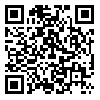Volume 73, Issue 1 (April 2015)
Tehran Univ Med J 2015, 73(1): 60-64 |
Back to browse issues page
Download citation:
BibTeX | RIS | EndNote | Medlars | ProCite | Reference Manager | RefWorks
Send citation to:



BibTeX | RIS | EndNote | Medlars | ProCite | Reference Manager | RefWorks
Send citation to:
Hakim A, Kompani F, Bahadoram M. Factors affecting nocturnal enuresis amongst school-aged children: brief report. Tehran Univ Med J 2015; 73 (1) :60-64
URL: http://tumj.tums.ac.ir/article-1-6575-en.html
URL: http://tumj.tums.ac.ir/article-1-6575-en.html
1- Chronic Disease Care Research Center, Faculty Member of Nurs-ing Department, Ahvaz Jun-dishapur University of Medical Sciences, Ahvaz, Iran.
2- Department of Nephrology, Med-ical University of Ahvaz, Ahvaz, Iran. ,kompani-f@ajums.ac.ir
3- Student Research Committee, Ah-vaz Jundishapur University of Medical Sciences (AJUMS), Ah-vaz, Iran.
2- Department of Nephrology, Med-ical University of Ahvaz, Ahvaz, Iran. ,
3- Student Research Committee, Ah-vaz Jundishapur University of Medical Sciences (AJUMS), Ah-vaz, Iran.
Abstract: (6025 Views)
Enuresis is the inability to control urination during sleep. It is one of the most common childhood urologic disorders. Nocturnal enuresis refers to the occurrence of involuntary voiding at night after 5 years. Persistent nocturia can decrease self-esteem, increase anxiety and other emotional problems in children. The aim of this study is to evaluate the factors affecting nocturia amongst school-aged children. Methods: This cross- sectional study was conducted on 200 children over a period of 3 months from 21 April to 22 July 2014 (. Subjects of this study included 200 children (100 boy and 100 girl) aged 6 to 12 years that referred to the urology clinic. Following the written consent, patients under study were divided into two groups according to gender. A questionnaire concerning the personal data was completed for each patient. Questionnaires were completed by interviewing parents. Results: Our investigation revealed that 32% of children had nocturnal enuresis. The Chi-square test demonstrated significant differences between the case and control groups in terms of gender (P= 0.002), positive family history (P= 0.004), deep sleep (P= 0.005) and high fluid intake (P= 0.00). Significant differences were not observed among enuretic children with parents' education level, income, number of family members, birth order, history of injury and hospitalization, birth of a new baby, moving house, problems at school and home, snoring, mouth breathing, urinary tract infections, constipation (P> 0.05). Conclusion: In order to control enuresis it seems essential to provide information about nocturia and its etiologic factors to the children and their parents by the physician.
Type of Study: Brief Report |
Send email to the article author
| Rights and permissions | |
 |
This work is licensed under a Creative Commons Attribution-NonCommercial 4.0 International License. |





